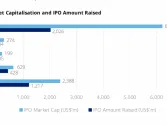
Guess who'll be hardly hit by the slowdown of Asia's advanced economies
Growth forecast for Asia-Pac may be hazy.
According to Standard and Poor's Ratings Services the risks to its growth forecasts for economies in Asia-Pacific remain mostly external and tilted toward the downside.
Asia's smaller, more trade-dependent economies would be hit hardest if growth in advanced countries slows down. And that can come from either a weaker-than-expected U.S. recovery or a further decline in Europe.
"Within the region, China has rising internal risks in its financial sector, but they appear to be contained," said Paul Gruenwald, Standard & Poor's Asia-Pacific chief economist.
GDP for the Asia-Pacific region expanded 5% year on year in the first quarter, compared with 5.6% in the fourth quarter of 2012. Production and trade remained soft in the second quarter. China has slowed in both quarters, due largely to waning private and public investments.
Emerging Asian economies fared slightly worse, with 6% first-quarter growth, down 0.7 percentage point from the final quarter of 2012. Japan, however, leaped into the spotlight, with indications that the economy's initial reaction to "Abenomics" has been positive.
"A slowdown in China will have a ripple effect on Australia and other economies that export heavily to China. Two important risk factors are the pace of Chinese investment and real GDP growth, and the strength of the U.S. economic recovery," Mr. Gruenwald said.
Standard & Poor's forecasts a modest growth pickup in Asia-Pacific, stemming from an expected rebound in the U.S. economy later this year and in 2014.
But economic activity in most of the region remains below trend, thanks mostly to Europe's growth being flat at best; Europe was Asia's biggest trading partner before the global financial crisis.
"The effect of slower demand from outside Asia-Pacific on growth in the region is amplified by a weaker expansion in China, with the Xi Jinping and Li Keqing government appearing to place more importance on financial stability than on achieving faster growth," Mr. Gruenwald said.















